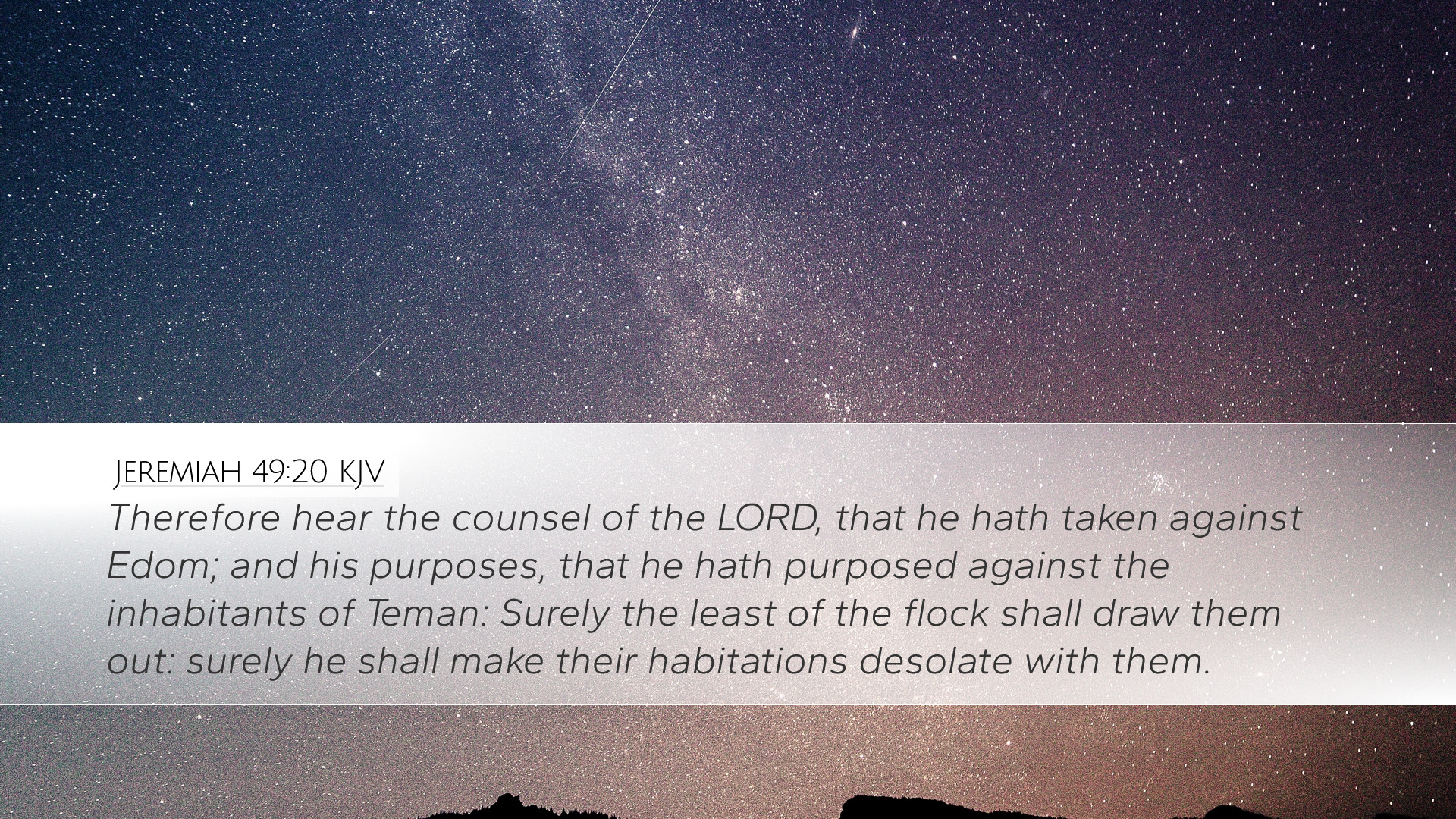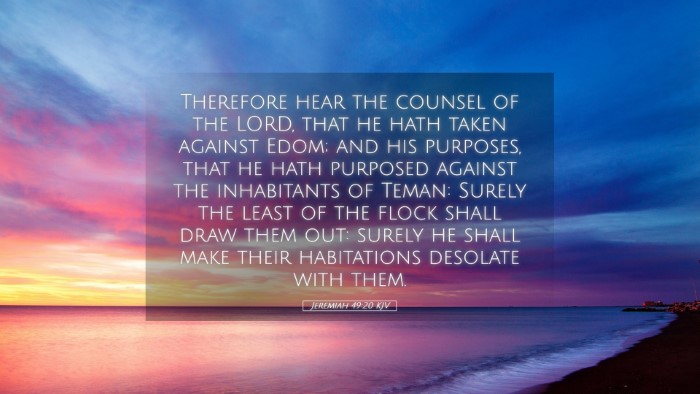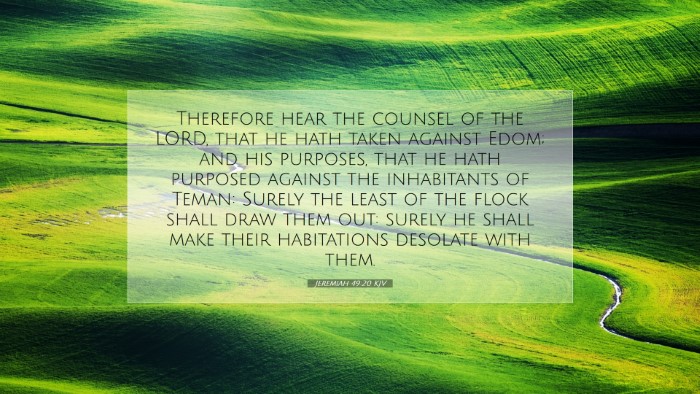Commentary on Jeremiah 49:20
Verse: Jeremiah 49:20 - "Therefore hear the counsel of the Lord that he hath taken against Edom; and his purposes that he hath proposed against the inhabitants of Teman: Surely the least of the flock shall draw them out: surely he shall make their habitations desolate with them."
Introduction
The prophecy against Edom, as articulated in Jeremiah 49:20, is laden with significant theological implications and historical nuances. Both the text and its interpretation have offered valuable insights into God's sovereignty, justice, and the inevitability of divine judgment. This commentary combines perspectives from Matthew Henry, Albert Barnes, and Adam Clarke to provide a comprehensive understanding of this verse.
Contextual Background
Edom, a nation descended from Esau, stood in stark contrast to the people of Israel. Historically, Edom's relationship with Israel was marked by hostility and conflict, as the Edomites often rejoiced in Israel's misfortunes. The prophetic message given to Jeremiah reflects God’s impending judgment upon Edom due to their persistent rebellion and failure to heed divine counsel.
Exegetical Insights
1. Divine Counsel and Purposes
“Therefore hear the counsel of the Lord that he hath taken against Edom;” (Jeremiah 49:20). Jeremiah emphasizes that the message is divine and stems directly from the Lord's will. Matthew Henry highlights the importance of understanding that God's counsels are immutable; what He has decreed is certain to come to pass.
- Albert Barnes comments on the significance of 'counsel'. He notes that God’s plans are often communicated through His prophets, emphasizing the need for listeners to heed these warnings.
- Adam Clarke elaborates that God's counsel refers to His foreknowledge and omnipotence. The plans devised against Edom are reflective of God’s sovereignty over nations.
2. The Inhabitants of Teman
Teman, referenced in this passage, was a significant city in Edom. It served as a symbol of Edomite pride and strength. The mention of Teman indicates that the judgment encompasses not only the nation of Edom but highlights the pride of its inhabitants.
- Matthew Henry stresses that the fall of Teman signifies the downfall of the proud heart. The desolation of such a proud place serves as a stark reminder of the futility of human pride against divine judgment.
- Albert Barnes notes that Teman was known for wisdom ("Teman shall be no more"), indicating that even man's wisdom cannot stand against the judgment of God.
3. The Least of the Flock
The phrase “Surely the least of the flock shall draw them out” refers to the idea that even the weakest elements in Edom will partake in drawing out divine judgment. This conveys a dramatic reversal of fortunes, where the seemingly insignificant will play a critical role in God's plans.
- Adam Clarke attributes significance to this idea by noting that God often utilizes the least expected means to fulfill His purposes. It portrays how God can use even the lowliest agents to bring about judgment.
- Matthew Henry suggests that it serves to emphasize God’s power, indicating that none can escape His judgment, regardless of their perceived strength or position.
4. Desolation and Abandonment
“surely he shall make their habitations desolate with them.” This concluding phrase encapsulates the inevitable consequence of disobedience and pride. The threats of destruction hang heavily upon Edom as a direct consequence of their actions.
- Albert Barnes observes that God's judgment often manifests through desolation—a powerful reminder that divine justice is not merely punitive but also corrective.
- Matthew Henry extends this idea, indicating that such desolations are not random but are deliberately tied to the behavior of the people. God’s judgment is proportionate to their pride and transgressions.
Theological Implications
The implications of Jeremiah 49:20 extend deeply into the theological fabric of prophetic literature. The reference to God’s counsel serves as a reminder to both ancient Israel and contemporary believers of the importance of aligning with divine revelation.
- Divine Sovereignty: The certainty of God's judgment against Edom demonstrates His control over nations and history. The prophetic warnings underscore God’s eternal purpose and the reality of human accountability.
- Pride and Humility: The fall of Edom serves as a timeless lesson on the perils of pride. As churches and communities reflect on this, it addresses the broader principle of humility before God and reliance on His strength rather than human might.
- Justice and Hope: While the prophecy illustrates divine judgment, it also serves a dual purpose of hope for the oppressed. It reassures those who suffer injustice under oppressive powers that God will ultimately hold the wicked accountable.
Conclusion
Jeremiah 49:20 offers a profound insight into the nature of God’s justice and the fulfillment of His promises, even against nations like Edom that appear strong and self-reliant. In drawing from the rich commentaries of biblical scholars, this analysis highlights the call to heed God’s counsel, embrace humility, and recognize the ultimate sovereignty of God over history and our lives.


